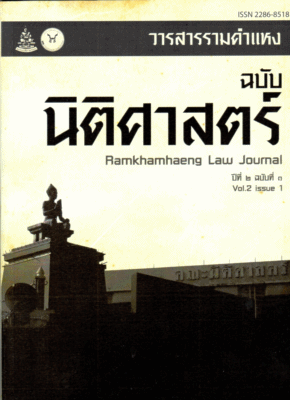การจัดการด้านสิทธิเงินทดแทนกรณีประสบอุบัติเหตุขณะทำงานของแรงงานต่างด้าวผิดกฎหมายภายใต้พระราชบัญญัติเงินทดแทน พ.ศ. 2537
Main Article Content
Abstract
Abstract in Thai unavailable
The treatment for illegal foreign workers as regards workmen's compensation for accidents under the Workmen's Compensation Act, B.E. 2537 (1994)
The research objectives herein are addressed with an evidence-oriented approach. The goal is to enhance the understanding of the barriers or shortcomings perceived in workerûs compensation issues arising from work accidents in accordance with the Workmenûs Compensation Act, B.E. 2537, which currently prevent immigrant workers from accessing compensation coverage. The research methods used to complete the studyûs objectives included the desk review and analysis of documents related to policy implementation and the impact of various policies and programs for migrant workers. Additionally, qualitative data from key informant interviews was analyzed.
The results of the research revealed that the impact and implications of the policy constraints on the validity period for the Open Registration Process would still render the inclusion of migrant workers in its Workmenûs Compensation Fund impracticable. The revocation of Social Security Office (SSO) Circular RS 0711/W751, and the revision of the new SSO Circular RNg 0607/W 987 and RNg 0607/W988, did not create a policy of discrimination against immigrant workers separate from the Workmenûs Compensation Fund as petitioned. Affiliation with the fund is dependent on the discretion of the employers according to the Workmenûs Compensation Act.
Although the proposed alternative forms of access to the private insurance fund scheme include protection for migrant workers in case of work-related injuries, the alternative system is still deficient in this regard. Without any specific legislation to force the employers to purchase private insurance for illegal migrant workers it remains a voluntary private insurance alternative scheme. Several restrictive conditions notwithstanding, the current insurance scheme has not succeeded in providing benefits that would cover all workers. Additionally, social protections and social security policies as currently systematized by private insurance companies have not been sufficient to supplement the benefits provided by the Workmenûs Compensation Fund. The situation of migrant workers is characterized by higher vulnerability and discriminatory practices.

